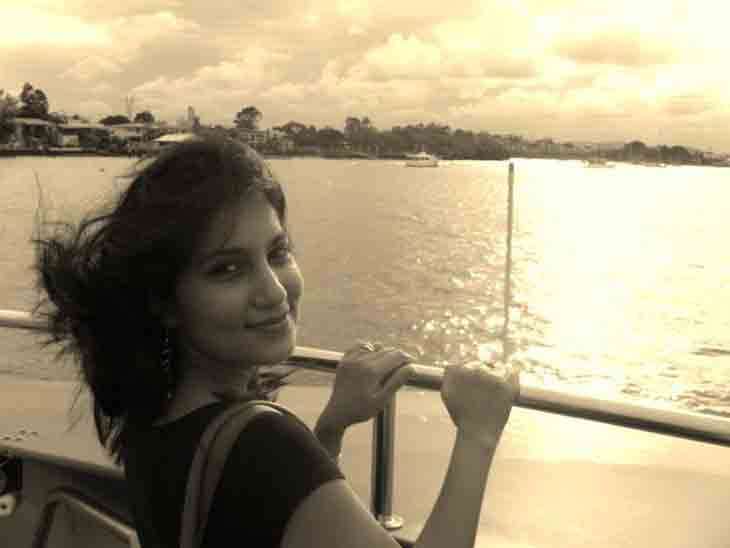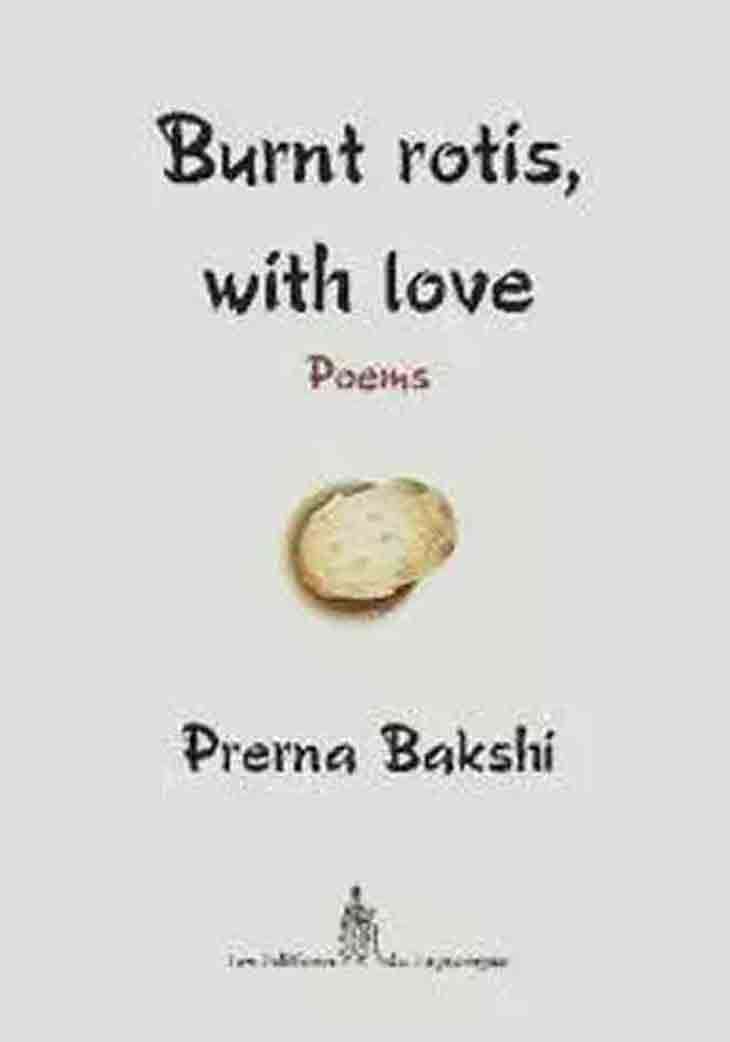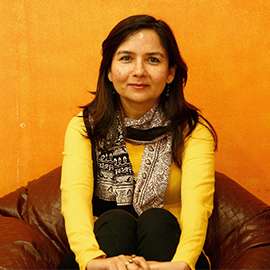For women: How to burn rotis & fight patriarchy

Prerna Bakshi has been writing poetry for as far back as she can remember. It started off mostly as an exercise to escape from her own personal battles. As she grew older the line between the personal and the public began to diminish. By the time she was ready with her first book of poems, she was wise enough to know that she would be wasting her time knocking on any Indian publisher's door.
Wendy Doniger's book on Hinduism had been just pulped and most poetry books read like odes to trees that bore fruits and flowers that were in full bloom. Bakshi's strong imagery and metaphors obviously stood no chance -- except for the occasional publication of a poem in a foreign journal of repute. Here's why:
My Radha is a slut
who could care less
about people questioning her morality.
In full control of her sexuality
she freely lusts over her men,
relentlessly lusts over
Krishna - the God of love.
Fortunately for Bakshi, Les Éditions du Zaporogue (Denmark) decided to publish Burnt Rotis, With Love. The book has already been cited as one of the "9 Poetry Collections That Will Change The Way You See The World" by Bustle.

Challenging the status quo
Bakshi, 31, splits her time between India and Macau. Her poems encourage women to burn rotis, to be imperfect, to be immoral, to be unruly, to upset the status quo.
Be an unruly woman. Be that woman who laughs aloud at people who tell her that she shouldn't laugh aloud in public. Laugh aloud and show those sharp teeth that are meant to bite and chew. Chew off people's unsolicited advice telling you what to do.
In an email interview, Bakshi tells Catch, "The book challenges the status quo, the common perceptions and attitude of people, the weight of their expectations that burden women and reduce them and their role in society, their capacity as human beings, to whether they can make round rotis. The women in my book are not 'perfect', nor are they striving to be. They are complete and perfect, just as they are, in all their 'imperfections'. They are not afraid to burn rotis, and more importantly, they are not apologetic for it."
She admits her poetry is unashamedly political.
"...the kind of poetry that gets published in India, from my understanding, especially the mainstream Indian English poetry, shies away from touching subjects it finds are too radical or too political and that's fine. I have no interest in that. I'd continue to do my own thing."
She says she did not approach any Indian publisher lest they'd ask her - "what's the name of your pind?"
What's the Name of Your Pind is one of Bakshi's poems where she writes about how a woman's history, her identity, her pind (lineage), does not matter in the male-dominated universe we live. The poem is in memory of her grandmother whose lineage seized to matter once she was married off into another family.
Love in the aftermath of marriage: three unhappily married poets tell the truthMy Women Have Spoken
Bakshi's poems pull one out of the comfort zone.
In My Women Have Spoken she trashes patriarchal myths and narratives that have long ignored, excluded and marginalised women's voices.
My Sita is a transgressor
who takes risks who violates rules
who breaks moral laws
who crosses laxman-rekha, boundaries of patriarchy.
My Sita is a brave single mother
who can brave any storm
without the need of any Rama.
"The poem is an attempt to retell, recreate, and reclaim history, myths, and folklore from a feminist perspective. In the context of India, doing so is even more crucial today when dissent is increasingly being stifled, especially under the current Hindu nationalist right-wing government. This poem was a small attempt to re-imagine, re-interpret, and re-construct dominant texts, epics, and scriptures such as Ramayana and Mahabharata."
A lot of abuse came Bakshi's way after this poem's publication. "In case this poem has disturbed some people, maybe they've been comfortable for far too long," she says.

Why Poetry?
Writing poetry helped Bakshi recover from trauma to an extent - though healing, for her, is an ongoing journey.
"Just as writing poetry has helped several others writers who have come before me, from Anne Sexton to Sylvia Plath to Amrita Pritam - writers whom I had admired for years, I believe poetry has the potential to heal people, even if not fully. It is such an essential, yet so under-reported and undervalued aspect of it."
However, apart from healing, Bakshi believes poetry plays a significant role in transforming and raising people's consciousness.
"Poetry helps us understand the world and make sense of it. It leads us to new ways of conceiving the world around us and a new world, today, is more than necessary. In the current socio-political climate, when the space for dissent is shrinking rapidly, it is crucial to recognise the vital role poetry can play in exposing and challenging the current social hegemonic order."
Bakshi says all art is political - whether we choose to admit or not.
"We live in a very political world and this idea that poets and artists, could somehow create 'art for art's sake' and claim that 'it's not political' or that 'it doesn't serve any political purpose' is deeply flawed and frankly quite ridiculous. Art could be beautiful, emotional, vulnerable personal, political and dangerous at the same time."
Her Poems
Through her 54 poems Bakshi has become the voice of workers, peasants, indigenous people, women and children.
The Coward Gods smiling away inside the temples as school dropouts wait outside for prasad - the priests acting as "bouncers" of an elite club because the boys hail from a lower caste.
In The Blood Suckers the factory owner sucks the blood of a labourer during the day and mosquitoes at night.
So I let them (mosquitoes) suck for a while.
I let them suck my blood
as I do not have
much else to offer.
At least, this way,
one of us
would not sleep
hungry at night.
Bakshi is a fiery feminist.
"To be a feminist, to put it very simply, is to believe that people of all genders - I don't believe that there are only two genders - should be treated as equal. That they should have social, political and economic rights and the right to live their lives without discrimination," says Bakshi.
She makes fun of men who expect women to cook and live the age-old stereotype.
In The Cooking Gene, she writes:
He asked if I could cook.
So I asked if he could hunt.
"Hunting? No. Why would I know that?" he said.
"Oh 'cause if you can't hunt, then what would I cook?" I said perplexed.
"Well, you're supposed to know
how to cook
for you're a lady."
I didn't know there was a cooking gene
women carried innately.
A tale of round rotis
It is shocking that a woman's worth in the 21st century is gauged by her ability to make "round rotis". Even more shocking is the fact that a 13-year-old Aniqa was killed by her father in Pakistan because she failed to make round rotis.
The poem, A Tale of Round Rotis is dedicated to her.
I like them Tedhi-Medhi.
Thank you!
Far from what's regarded
'perfect', I know.
But at least, this way, they resemble
our lives.
The lives of women.
Lives which are
far from perfect.
These imperfect, unsuitable rotis, then
are much more realistic, after all,
don't you think?
She takes potshots at the importance of women being married in Post Marriage Bliss, Sorry, Blues.
A married woman mustn't complain.
That's the job of others.
With each passing year, I may not
lose a lot of weight but I lose
a part of myself. I slowly disappear
into the crowd of women, or is it that
they disappear into me? Either way, we continue
to disappear until none of us survives
Women as Objects
Bakshi has given women a voice in her poems. She articulates their fears, their shame like no one else.
In A Public Space she writes about why she has no issues with airport body scanners.
I have no issues with airport body scanners
or with any such checks
for the invasive eyes of men
undress me every day...
...like she's been put on exhibition for the public gaze
with a banner hanging that reads:
Up for grabs!
Yes! Up for grabs!
Up for pinching!
Up for fingering!
Up for harassment!
Up for molestation!
She has also written about children being sexually abused. Or the pangs of the Partition of India. Bakshi's grandparents are the children of Partition. She is at her best when she writes The Death Train.
Except on that day
when it didn't matter
how women's breasts looked.
How big they were
or how small.
They were just right.
Just the right size.
The right shape.
The right shade.
The right kind of breasts
on the right kind of women.
The chosen women.
Women who were handpicked,
lined up,
one by one,
had their breasts chopped off;
blood gushing all over
This poem about why women mature faster than men is going viral for the right reasons First published: 23 August 2016, 9:37 IST






![BJP's Kapil Mishra recreates Shankar Mahadevan’s ‘Breathless’ song to highlight Delhi pollution [WATCH] BJP's Kapil Mishra recreates Shankar Mahadevan’s ‘Breathless’ song to highlight Delhi pollution [WATCH]](https://images.catchnews.com/upload/2022/11/03/kapil-mishra_240884_300x172.png)

![Anupam Kher shares pictures of his toned body on 67th birthday [MUST SEE] Anupam Kher shares pictures of his toned body on 67th birthday [MUST SEE]](https://images.catchnews.com/upload/2022/03/07/Anupam_kher_231145_300x172.jpg)






